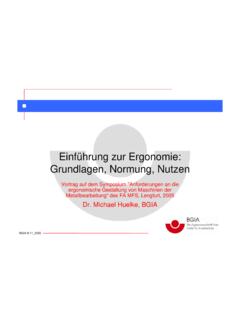Transcription of Evolution of Management Theories - edutalks.org
1 Evolution of Management Professor, Dept. of MEAl- AmeenEngg. College, ShoranurEmail: of Management Classical theory of managementa) Scientific Managementb) Bureaucratic Managementc) Administrative Theorya) Human Relationsb) Behavioral Science Modern Management Theoriesa) Quantitative Approachb) System Approach c) Contingency Approach d) Operational of Management Thought Impact of Industrial s Contribution(1856-1915) Father of ScientificManagementPrinciples of sManagement1)Scientific task setting based on time, motionandfatigue )Fitting the rightpersonfortherightjob by properselection, trainingand placementof )Improvement of toolsandequipmentii. Improvementinworkenvironment4)Employersa ndemployeesshould notfeel that theyareexploitingeachother(Mentalrevolut ion)5)Differentialpieceratewagesystem to distinguish between efficientandinefficient workers( Tayler s Differential Piece RatePlan)6)Intelligentinvestigation and analysis of thedifferentunit of the )Scientific study ofeachunit of the )Separationof the planningandexecutionbasedon of Gilbreths Scientific study of Management should include both analysis and synthesis Analysis- Breaking down atask into its essential elementsSynthesis include necessary element for efficient work and eliminateotherelements.
2 Heconcentrated on MotionStudy and suggestedthe firstdefinition- motionstudyasthe science of eliminating wastefulness resultingfromunnecessary,ill directedandinefficientmotions Hedeveloped Process Chart-Overallpicture ofall activities ina chart of Workedwith HeImproved Taylor sdifferentialpiecerate systemTas kand BonusPlan(Provide extra wages for extra work) Hedeveloped the dailybalance chart (Gantt chart)outputinone axis andtimeonthe other axis. Humanistic approach and industrial Management of Scientific Management Main contributors- , Frank Gilbreths, Gantt Impact of Industrial RevolutionPrinciples of Scientific Management1)Replacement of old rule of thump method2)Scientific selection and training3) Labor- Management co-operation(mental revolution)4)Maximum output5)Equal division of of Scientific Management1)Scientific task setting-fair day s work2)Work study-method, time, fatigue and motion study3)Planning the task4) Standardisation5) Scientific selection and training6)Differential piece-wage plan7) of Scientific Management Functional organization structure(Anoperator is controlledbyeight foremen) In practice and violates unity of command.
3 It concentratedonproductionmanagementand ignores theareaof Finance, Marketing, Accounting and Personnel. WorkersobjectedTayler s Differentialpiecewage planbecausewagesofworkers are notincreasedin directproportion to theincreasein productivity. It underminedthehuman factor in industry. It resultedinmonotony of job, loss of initiative, wage reductions,jobinsecurity Management Max Weber(1864-1920) Rules and regulations to eliminate managerial inconsistenciesCharacteristics1)Division of work2)Hierarchy of position3)Rules and regulations4)Impersonal conduct5) Staffing6)Technical competence7)Official Management Henri Fayol (1841-1925) Father of modern Management Introduced pyramidal form of consist 6 types of activities1)Technical Activities(Production, Manufacturing)2)Commercial Activities(Purchasing, Selling and Exchange)3)Financial Activities(Optimum use of capital)4)Security(Protection of property and persons)5)Accounting (Stock taking, Balance sheet, costing, statistics)6)
4 Managerial (Planning, organizing, coordinating and controlling) OF Management (HENRI FAYOL S 14 PRINCIPLES) It implies list of current Management practices1)Division of work(or Labor)2)Authority & Responsibility3)Discipline4)Unity of command5)Unity of direction6)Subordination of individual to general interest7)Remuneration8)Centralisation of authority9)Scalar chain or Line of authority10)Order11)Equity of treatment12)Stability of workers13)Initiative14)Team spirit (Espirit de crops) THEORY Relations EltonMayo- Founder ofHuman Relations. HeconductedonexperimentonHawtroneplantof westernelectriccompany andconcluded thatproductionefficiencyof workersdependsuponemotional factors. Happy&satisfiedemployeestrying Science Approach Maincontributors -Maslow, Application of behavioralsciencesuch aspsychology,sociology & anthropology to the study of human )Organisation isbasicallya socialsystem and ) Individuals may behave differently under different ) Attempts should bemadeto connect organisational goals &human )Managementmust developsocialskills inaddition totechnicalskill.
5 Manto man relationship, teamspirit & groupharmony should be given top preference by Management THEORIESQ uantitative Approach Maincontributors Taylor, Gilbreths, Gantt, Newman & )Managementis concernedwith problem solvingandit mustmakeuseofmathematicaltoolsandtechniq uesforthe )Thedifferentfactorsinvolved inmanagement canbequantifiedandexpressed in theformofequationswhichcanbe solvedwith the help ) )Operation research,mathematicaltools, simulationandmodelbuildingarethe basic methodologies developed by Approach Main contributors Johnson,Churchman,Kenneth, Boulding& RosenZweig Relatedtoorganisation systemis definedas Anestablished arrangementofcomponents whichleadstoaccomplishofparticular objectives as perplan Allorganisationsareopen Contingency Approach Maincontributors John Woodward, Fiedler, Lorsch &Lawrence.
6 Managementis situational & main objective of Management isto identify the important variables in the situations. 3 Major parts of overall conceptual frame work forcontingency management1. Environment2. Management concepts, principles & Contingent relationship between (1)&(2) Operational Approach Maincontributors-Koontz,O DonnellandWeihrich It regards Management as a universally applicablebody of knowledge that can be brought to bearatalllevelsofmanaging and in all types ofenterprise. Itrecognizes that theactualproblems whichmanagers face and the environment in which theyoperate may vary between different enterprisesand




